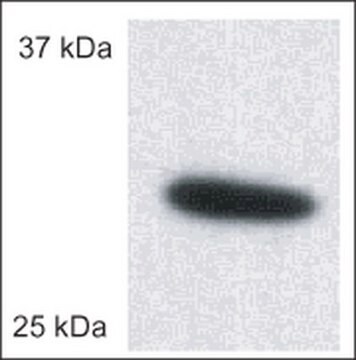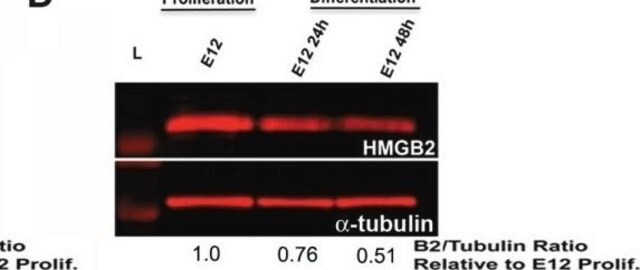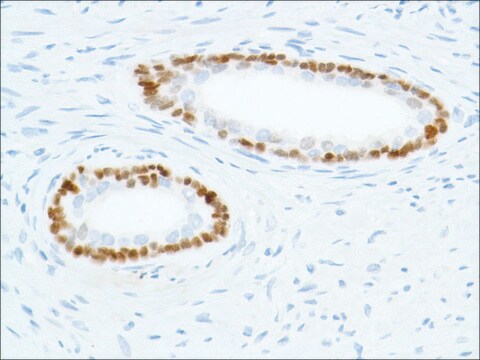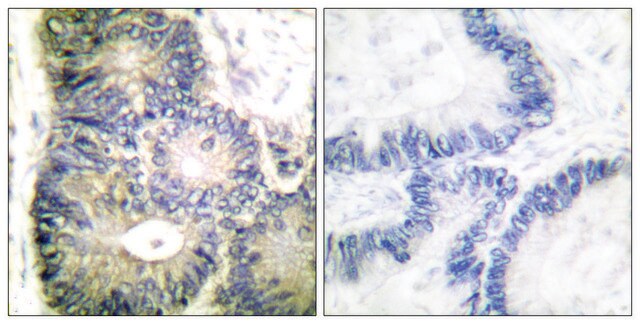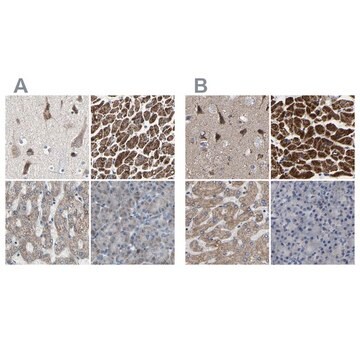ABN302
Anti-Complex I-75kD Antibody
from rabbit, purified by affinity chromatography
Synonim(y):
NADH-ubiquinone oxidoreductase 75 kDa subunit, mitochondrial, Complex I-75kD, CI-75kD
About This Item
Polecane produkty
pochodzenie biologiczne
rabbit
Poziom jakości
forma przeciwciała
affinity isolated antibody
rodzaj przeciwciała
primary antibodies
klon
polyclonal
oczyszczone przez
affinity chromatography
reaktywność gatunkowa
mouse, rat, human
reaktywność gatunkowa (przewidywana na podstawie homologii)
bovine (based on 100% sequence homology), chimpanzee (based on 100% sequence homology)
metody
immunohistochemistry: suitable (paraffin)
western blot: suitable
numer dostępu NCBI
numer dostępu UniProt
Warunki transportu
wet ice
docelowa modyfikacja potranslacyjna
unmodified
informacje o genach
human ... NDUFS1(4719)
Opis ogólny
Immunogen
Zastosowanie
Neuroscience
Developmental Signaling
Western Blotting Analysis: A 1:5,000 dilution from a representative lot detected Complex I-75kD in rat brain, human brain, and human heart tissue lysates.
Immunohistochemistry (Paraffin) Analysis: A 1:1,000 dilution of this antibody detected Complex I-75kD in human kidney and human heart tissue sections.
Note: Actual optimal working dilutions must be determined by end user as specimens, and experimental conditions may vary with the end user.
Jakość
Western Blotting Analysis: A 1:5,000 dilution of this antibody detected Complex I-75kD in mouse brain tissue lysates.
Opis wartości docelowych
Postać fizyczna
Przechowywanie i stabilność
Inne uwagi
Oświadczenie o zrzeczeniu się odpowiedzialności
Nie możesz znaleźć właściwego produktu?
Wypróbuj nasz Narzędzie selektora produktów.
Kod klasy składowania
12 - Non Combustible Liquids
Klasa zagrożenia wodnego (WGK)
WGK 1
Temperatura zapłonu (°F)
Not applicable
Temperatura zapłonu (°C)
Not applicable
Certyfikaty analizy (CoA)
Poszukaj Certyfikaty analizy (CoA), wpisując numer partii/serii produktów. Numery serii i partii można znaleźć na etykiecie produktu po słowach „seria” lub „partia”.
Masz już ten produkt?
Dokumenty związane z niedawno zakupionymi produktami zostały zamieszczone w Bibliotece dokumentów.
Nasz zespół naukowców ma doświadczenie we wszystkich obszarach badań, w tym w naukach przyrodniczych, materiałoznawstwie, syntezie chemicznej, chromatografii, analityce i wielu innych dziedzinach.
Skontaktuj się z zespołem ds. pomocy technicznej